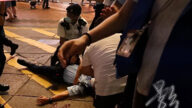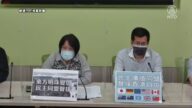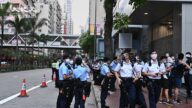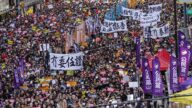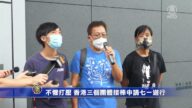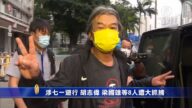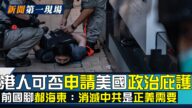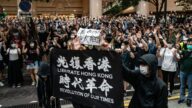【新唐人2012年9月3日讯】继7月29号,9万香港民众举行大游行,敦促香港政府撤回所谓的“国民教育”之后,9月1号又有超过4万港人举行集会,反对港府协助中共对香港学生进行红色洗脑。同时,香港青年学生们的绝食抗议也从8月31号接续到9月2号。但迄今,港府还没有撤销国民教育科的表示。
民间反对国民教育科大联盟发言人沈伟男:“政府一天不撤回,我们一天都不会撤走,我觉得这是非常强烈的讯号。”
9月1号,香港“民间反对国民教育大联盟”在港府旁边的添马公园集会,呼吁“以良心守护孩子”,有超过4万人出席,其中很多是家长和孩子。主办方强调,如果当局9月3号前不撤回洗脑科目,他们将会升级行动,有可能进行罢课。
去年5月份,香港政府决定将“德育及国民教育科”列为香港中小学必修课,并要求各学校在3年内实施。而在香港国民教育服务中心出版的国民教育参考书中,大部分内容是在为中共歌功颂德,掩盖它的丑事。
这种所谓的“国民教育”立即引来了香港民众接连不断的抗议浪潮。
8月30号,香港学生组织“学民思潮”成员和一些学生,在港府总部大楼前集会并架起帐幕,展开“占领政府总部行动”。其中3名学民思潮成员进行绝食抗议,要求政府撤回“国民教育科”。
香港作家张成觉:“参加绝食的学生充满了年轻人的激情和正义感,他们能够对北京政权、这个强权政治的洗脑做法,用行动来说不,这是很令人振奋的事情。”
同时,“学民思潮”成员在政府总部的抗议也在继续。9月2号,3位绝食中学生停止绝食后,又有另外10名大学生、教师开始绝食。
对此,15岁就参加了89年学生运动的北京维权人士胡佳深有体会。他认为,香港的学生完全有独立判断的能力,他们作为公民有权利采取这种行动给政府施压。
2006年,北京维权人士胡佳因为和高智晟律师参与中国维权绝食接力被抓捕。在被监禁中,胡佳曾经绝食长达30天。他非常了解绝食的痛苦。
胡佳:“当这3名中学生停止绝食的时候,我很欣慰地看到,一些大学生开始接力。我真的希望这个绝食能够一直坚持,直到香港政府收回国民教育科。”
89六四民运人士方政指出,香港所传承下来的民主自由理念,对中国大陆有很大影响。每年都有一些大陆人来香港参加六四烛光晚会。
89六四民运人士方政:“香港的存在对中国大陆的这种集权统治、对共产党政权、对一党专政,是一个最大的威胁。它(中共)害怕了,所以它要来这样(搞国民教育洗脑)。我觉得这是一个战斗、一个自由阵地的征战,非常重要。”
方政强调,今天的中共民心全失、逆天而行,即使它强行在香港推行洗脑课,也会遭到更强大的反弹,以失败告终。
2003年,港府曾经遵从中共旨意,要在香港实施《国家安全条例》,也就是俗称的23条,打压香港的民主自由,但遭到香港民众的强烈反对。2003年7月1号,超过50万港人上街抗议23条立法。最后,港府被迫让步,宣布搁置23条。
采访/易如 编辑/李谦 后制/萧宇
Hong Kong Students Go on with Hunger Strike against CCP Brainwashing
Following the protest by 90,000 people on July 29 urging
Hong Kong government to withdraw the “national education"
program, on September 1, more than 40,000 people held a rally
against HK Government, which assists the Communist regime’s educational brainwashing plan.
HK students also began a hunger strike on August 31.
To date, HK government has no plan to revoke the National Education plan.
Spokesman of the alliance of activists against the
national education program, Shen Weinan says,
“We will not leave as long as the Government does not
withdraw the program. I think this is a very strong signal."
September 1, Hong Kong’s alliance of activists against
the national education program, conducted a rally at Tamar Park calling to “guard the children with conscience”.
More than 40,000 people attended the rally,
many of whom were parents and children.
Organizers stressed that if the authorities do not withdraw
the brainwashing program, they will upgrade the action and carry out the students strike.
Last May, the Hong Kong government listed the “moral
and national education" as mandatory in elementary and
secondary schools, as well as required implementation
of the subject in three years.
National education guidelines published by the National
Education Services Center of Hong Kong includes pro-communist content and ignores scandals of the regime.
This “national education" guideline immediately caused
waves of protests by the people of Hong Kong.
August 30, Scholarism, an organization composed of
Hong Kong secondary students, and many other students,
gathered in front of Government Secretariat and set up the
protest carnival to “occupy the government headquarters.”
Three members of Scholarism started a hunger strike to ask
Hong Kong to withdraw the “national education" lessons.
Hong Kong writer Zhang Cheng-Jue: “The hunger strike
students are full of passion and a sense of justice for the youths.
They say no to the Beijing regime, to the brainwashing
practices of the power with their actions. This is very exciting."
The protest at the government headquarters continues
on September 2,
as 10 more university students and teachers went on the hunger
strike when the 3 high school students ended their hunger strike.
Hu Jia is a Beijing activist who joined the
1989 student movement at age of 15.
He shares his deepest appreciation of this protest.
He believes Hong Kong students are capable of independent
judgment, and as citizens, they have the right to take such action to pressure the government.
In 2006, Beijing human rights activist Hu Jia was arrested
for joining a hunger strike with Chinese lawyer Gao Zhisheng.
During the imprisonment, Hu Jia went on hunger strike
for 30 days. He is well aware of the pain of hunger strike.
Hu Jia: “When three high school students ended the hunger
strike, I was very pleased to see that some college students continued the relay.
I really hope that this hunger strike will go on until the Hong
Kong Government revokes the national education lessons."
Fang Zheng, a June 4 pro-democracy activist, indicates that
the concept of democracy and freedom inherited in Hong Kong has a great influence on the mainland.
Every year, a number of mainlanders come to Hong Kong
to participate in the candlelight vigil commemorating victims of the June 4 massacre.
Pro-democracy activist Fang Zheng: “The presence of Hong
Kong has been the biggest threat to the authoritarian Communist regime.
The CCP has fear and thus engages the National Education
brainwashing program. This is a battle, a very important expedition for freedom."
Fang Zheng stresses that the communist regime has totally
lost its popularity with the people.
The brainwashing plan in Hong Kong will only meet with
a stronger rebound and end in failure.
In 2003, Hong Kong security law, i.e.,
the Basic Law Article 23,
was suggested to comply with the communist regime
decree to suppress democracy and freedom in Hong Kong, but met with strong opposition.
July 1, 2003, more than 500,000 Hong Kong people took
to the streets to protest against the Article 23 legislation.
Finally, the HK Government was forced to make
concessions and announced the shelving of Article 23.


